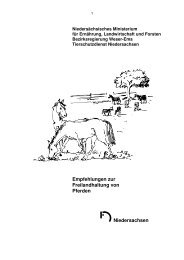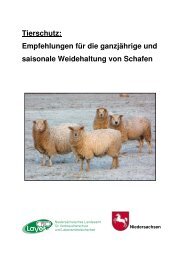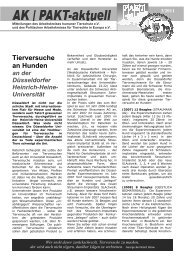Möglichkeiten und Probleme beim Vollzug tierschutzrechtlicher ...
Möglichkeiten und Probleme beim Vollzug tierschutzrechtlicher ...
Möglichkeiten und Probleme beim Vollzug tierschutzrechtlicher ...
Sie wollen auch ein ePaper? Erhöhen Sie die Reichweite Ihrer Titel.
YUMPU macht aus Druck-PDFs automatisch weboptimierte ePaper, die Google liebt.
129<br />
8. SUMMARY<br />
Martina Kuhtz<br />
Possibilities and problems with the execution of the Animal Protection Legislation<br />
Details, relating to the execution of the Animal Protection Legislation, of German Veterinary<br />
Offices were analyzed. Provisions in each of the Federal States were examined with the purpose<br />
of determining which were of benefit and which were a hindrance to Veterinary Officers<br />
carrying out their duties.<br />
The analysis concentrated on the staff situation and the structure of the Offices. Additionally,<br />
offences against the Animal Protection Legislation were evaluated with the regard to the concerned<br />
animal species and the measures taken against the offender.<br />
The Animal Welfare Officials of the Ministries of ten Federal States agreed to approve this<br />
study. A questionnaire was prepared which was sent to 347 Veterinary Offices. 155 Veterinary<br />
Officers answered, 25 others were interviewed, so in total 180 questionnaires could be evaluated.<br />
On average, three Veterinarians worked at one Veterinary Office. They spent aro<strong>und</strong> 20% of<br />
their work time for animal protection matters. Obviously some of the Veterinary Offices are<br />
<strong>und</strong>erstaffed, because 8% of the Veterinarians did not inspect animal keepings according to<br />
Art. 16 of the Animal Protection Law. In 53% of the Veterinary Offices the Veterinarians are<br />
also empowered to execute. It was considered that the restriction of working on a consultant<br />
basis only is prejudical and it was agreed by 126 Veterinary Officers, that means by 70%, that<br />
all Veterinary Offices should have executive power.<br />
The Veterinarians were asked which problems with the execution of the Animal Protection<br />
Law were most imortant within the catchment area of their Veterinary Office.<br />
Art. 16a of the Animal Protection Law was considered most often, that means by 76 Veterinary<br />
Officers (42%) to be difficult to realize. It was demanded to change the Law accordingly,<br />
but it also appeared necessary to clarify who would assume the costs incurred, if the owner of<br />
the animal was not able to pay.<br />
Three other problematic topics, which were payed special attention, were circusses, the cooperation<br />
with animal welfare organizations and the handling of dangerous dogs. It became evident<br />
that most Veterinary Offices are already in good contact with the local animal welfare<br />
organizations, which reduces the animal welfare related case load of the Veterinary Officers.<br />
13,997 cases were stated by 159 Veterinary Officers, which refered mostly - that means in<br />
79% - to pets. The offences concerned mainly the keeping of the animals.<br />
The results gained by this study as well as possible improvements were discussed with the<br />
Animal Welfare Officials of the ten Federal States.










